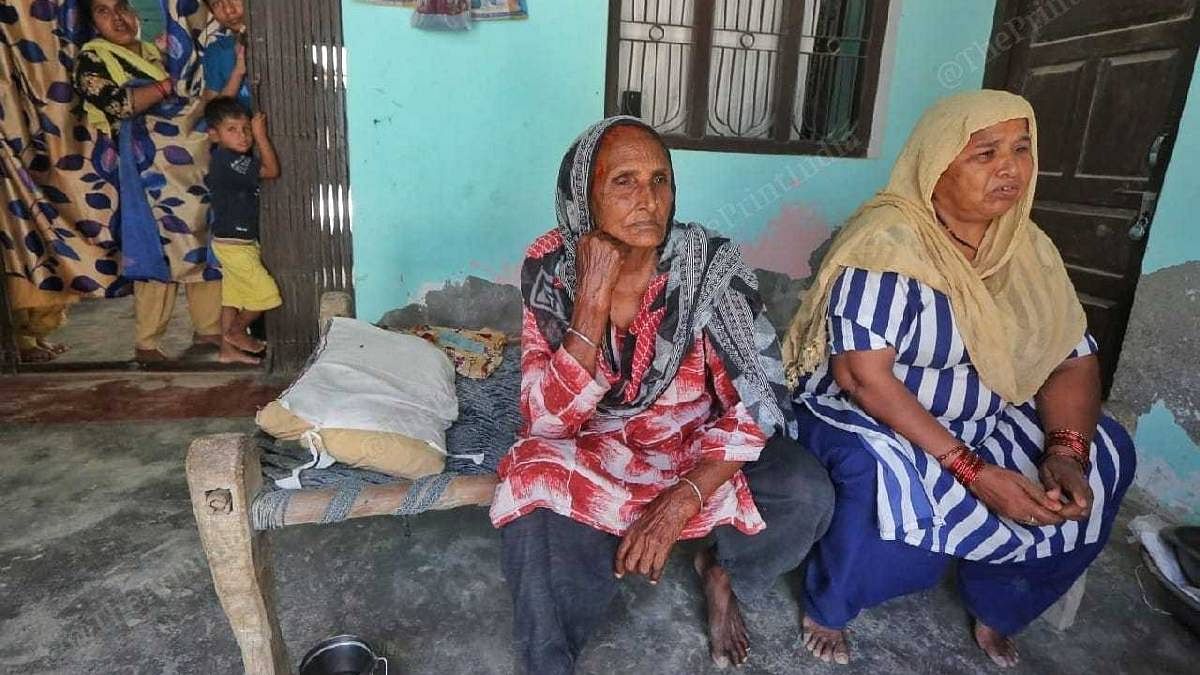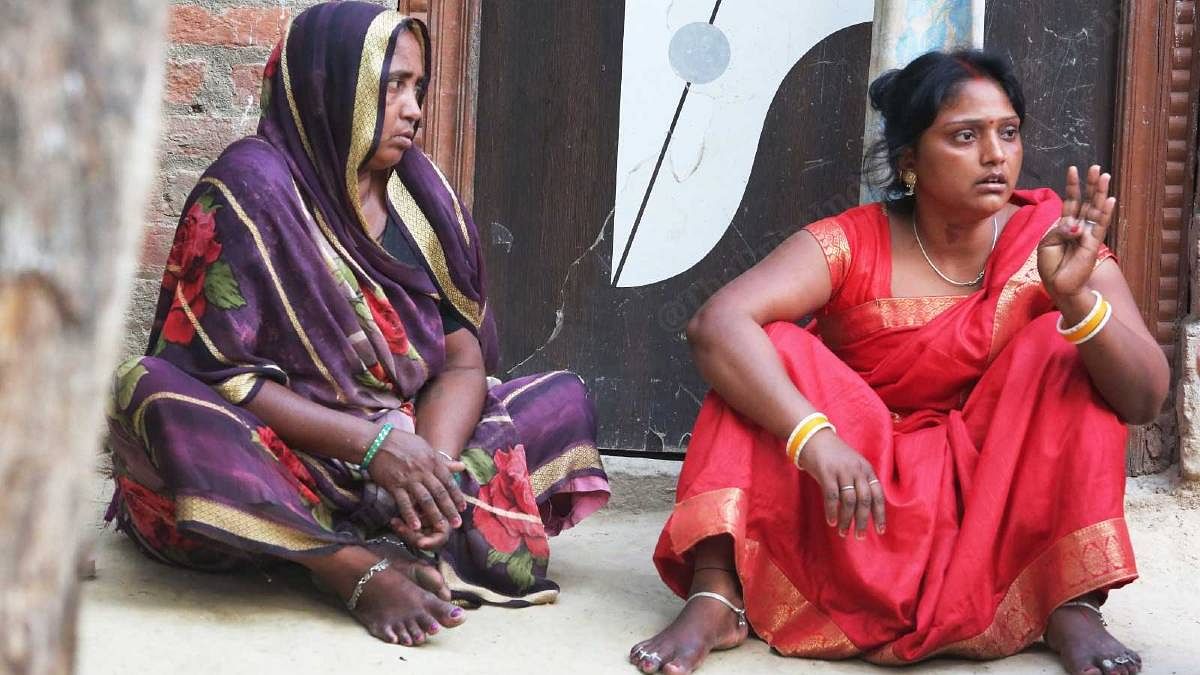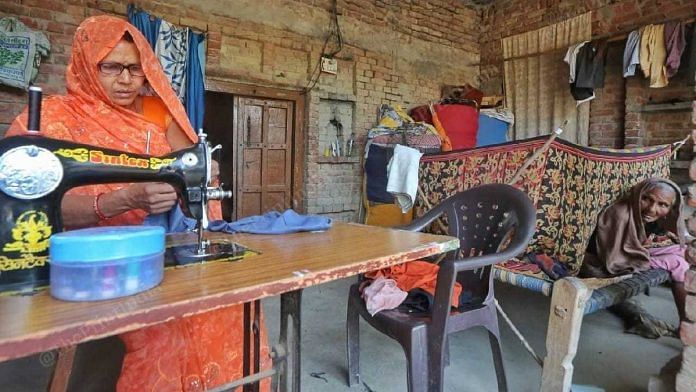Pratapgarh/Jaunpur: It was a hot summer day in Uttar Pradesh’s Pratapgarh district, with the Meteorological Office pegging the outside daytime temperature to 48 degrees Celsius. But the heat contributed little to Sarvari Begum’s unease as she sat on a cot in her one-room, minimally furnished house, with weather-beaten walls, set amid barren fields in Pratapgarh’s Basupur village.
“Has he done something again? Is he ok?” she asked ThePrint earlier this month, looking visibly unsettled. Her hands were clasped tightly, one thumb grazing her wrist.
Begum was referring to her son, Saddam Hussain, who was arrested by UP police for alleged double murder and robbery, after they found a country-made pistol — which allegedly belonged to him — under a pile of his books, stashed under on a parapet of their house, in March 2019.
Among the books were a copy of the Constitution of India, Mera Sangharsh — a Hindi translation of Adolf Hitler’s Mein Kampf — and books from a series on rapid English-speaking, said police sources.
Saddam, was then 21, a law student at UP’s Faizabad University.
Begum, a mother of five, who runs the house on the meagre salary her husband earns, working in the Railway department in Mumbai, is still in shock, struggling to comprehend the accusations against her “studious son”.
With tears in her eyes, she proclaimed his innocence to ThePrint, highlighting his aspirations of becoming a lawyer.
“They said he killed someone. How is it possible? He was a studious boy, who knew how to speak in English. Look at all his books,” she said.
“He wanted to become a lawyer and earn well for the family. He would cycle to Pratapgarh every day after college for his tuition, how do I believe that he killed someone for money?” Begum lamented.
Despite her disbelief, the police said they’d discovered Saddam’s involvement in numerous crimes over the two years before his arrest. They also alleged that he had been recruited by a local gang and became a “shooter” for them, after first proving himself with minor thefts and then graduating to dacoities.
Barely two kilometres away in another village in Pratapgarh, ThePrint found another similar case.
In her worn-out house in Madura Raniganj, Sarita Passi, a Dalit woman, sat working on her sewing machine, when ThePrint visited.
On one of the bare, unpainted brick walls of the house, hangs a framed black-and-white photograph of Passi’s late father-in-law, dressed in a police uniform. Beside her on the bed lies her ailing mother-in-law. Her husband is a farmer.
A mother of two, Passi runs the house with the small pension her mother-in-law receives for her deceased father-in-law’s services, some money she earns by stitching clothes, and what is earned by her farmer husband.
It is this family respectability — despite their limited means — which she cited while denying the allegations against her younger son, Ankur Saroj.
In February 2019, when he was just 18 and a student of class 11, Ankur surrendered for allegedly shooting a local businessman after he refused to pay the extortion money demanded from him.
Passi believes Ankur was “framed” by the local priest’s son, but she told ThePrint that she nevertheless urged him to surrender, fearing he might fall victim to an encounter killing.
“He had his differences with the pandit’s son and that is why today he is behind bars. Ours is not a family of criminals. His grandfather was a policeman, his father is a farmer. Why would he pick up a gun?” she asked.
Passi added: “He was studying and wanted to go pardes (abroad). But everything is over now,”.
The mother further said that she did not have the means to fight Saroj’s case in court.
Both Hussain and Saroj’s cases are all too common in Uttar Pradesh, where criminal gangs allegedly recruit young “shooters” for amounts as small as Rs 10,000.
The three “shooters” who allegedly killed gangster-turned-politician Atiq Ahmed and his brother Ashraf last month, are similarly believed to have been “small-time criminals” who were engaged by a gang and asked to carry out the killings”, according to a UP police source.
Aged between 17 and 20 years, the three accused — Lovlesh Tiwari, Arun Maurya and Sunny Singh — are suspected to have been hired by a “big gang”, which the police have not yet been able to identify. One of the three accused is alleged to be a former aide of Sunder Bhati, the once-feared gangster from western Uttar Pradesh, but nothing conclusive has been established yet.
Motivations among these shooters vary, ranging from a desire for recognition and wealth to the sense of power and authority associated with possessing and using firearms. According to police sources, factors such as economic hardship, unemployment, and caste-based discrimination may contribute to their vulnerability to being drawn into criminal activities.
“Not all shooters come from impoverished backgrounds, but the allure of the quick wealth associated with their trade attracts many facing unemployment or financial difficulties,” additional director general of police (ADGP) of UP special task force (STF), Amitabh Yash, who has investigated gang-related cases for the past 25 years, told ThePrint.
ThePrint travelled to two UP districts — Jaunpur and Pratapgarh — to find out how gangs target and recruit youngsters as shooters, as well as what motivates young men to join the world of crime.
Also read: Gangsters Act: The controversial law behind Yogi govt’s crackdown on dons like Mukhtar Ansari
Recognition, ‘rangbazi’, caste
There’s no hard data to support this, but anecdotal evidence suggests that Pratapgarh and Jaunpur are among the most popular recruiting grounds for shooters, according to police sources who spoke to ThePrint.
“We know that boys from these districts are hired and sent to other states to execute killings because police from different states keep coming here, looking for them. If a shooter is hired from here, then he is also sent to other states to carry out killings. Even Hussain and Saroj had gone to Daman and Diu for one such assignment just before their arrest in 2019,” a local police officer alleged.

For a gang, the biggest benefit of using these shooters lies in the cover of anonymity that they provide. For the new recruits, however, motivations may be more complex.
A senior police officer, speaking on condition of anonymity, claimed caste “plays a very important role” when it comes to youth joining the world of crime.
“A Dalit, who is often looked down upon by a Pandit in the area, suddenly feels empowered carrying a gun,” he observed.
“They (young shooters) are enticed by the prospect of a glamorous lifestyle and the power kick that comes with carrying a firearm. Shooters often exhibit their authority by forcibly entering restaurants and showrooms, and picking up things without paying any money. This rangbazi (display of being an alpha male) serves as a display of power and a means to gain respect in their circles,” the officer said.
According to a second senior officer, most of the youngsters also start idolising gangsters, who have access to money, weapons, and the power to get anything done.
“We have seen in most cases, youngsters idolise gangsters. They are almost besotted by these local bhaiyas, who are symbols of power and authority for them. Most of these youngsters desire to be a part of that power circle as they themselves aspire to command respect within their own communities,” the second officer said.
For both Hussain and Saroj, and for many others in Pratapgarh, this factor allegedly played a big role in pushing them toward crime.
One name which inspired many of the youth in the area is allegedly that of Yasir, who goes by only his first name — a sharpshooter from Bhuliyapur, Pratapgarh.
Between 2014 and 2017, Yasir was allegedly involved in several cases of murder, extortion, and dacoity, before being killed in an encounter in April 2017. A big name in Pratapgarh, most of the young shooters who followed, aspired to be a “dabang” (fearless character) like him. There was a glamour about his name, according to the second officer.
“He was known as Bhuliyapur ka sher (Bhuliyapur’s lion),” he said, adding that youngsters in the district, including Hussain and Saroj, even had a WhatsApp group named Yasir Bhai amar rahe (Long live Yasir Bhai).
“Interestingly most of them had never even met him,” he pointed out.
“In Bhuliyapur village, there was a tree where Yasir, when he was active, had written 1090 with bullets. That was a code word for his gang and that tree was a meeting point for all members. Such was the fear of him that even the police never patrolled that area,” the second officer added.
University ‘recruitment’, low starting ‘pay’
According to locals, in Pratapgarh, there is either a lawyer or someone pursuing a law degree in every second home.
According to the second senior officer, many law institutes have also sprung up across the district to meet this demand.
The reason why some youth are drawn to legal studies, according to him, is that being identified as a law student helps keep “police at bay”. Further, they believe they can “offer their services” to gangs by giving representation to their members if caught.
Most gangs operate through intermediaries, tasked with “identifying potential talent”, explained a third senior officer in the state.
Young men who are financially vulnerable, but desire power and money, are the most gullible, and make for the best candidates, claimed the third officer.
According to him, most of those who get recruited are college and university students — both state universities and unaccredited ones. The university in Faizabad, where Hussain was a student, has become a fertile ground for gangs to operate, according to the officer.
“For many aspiring shooters, the attention they receive from peers in their colleges and the easy money and power trip further bolster their desire to join these gangs,” the officer said.
The process of recruitment is very subtle, he added, and allegedly begins with seemingly innocent offers like providing an SUV to a youngster to go to college, which makes him popular among peers. Gradually they are then given a pistol, which these youngsters start perceiving as a status symbol.
“They first show them pistols and then tell them — achi lag rahi hai toh rakh lo (if you like it, keep it). That is the beginning of their life as a criminal,” the officer said.
He added: “Easy money gives them access to good alcohol and branded clothes, and they are subsequently drawn into minor criminal activities like theft and making ransom calls to prove their loyalty to the bhaiya (the intermediary),” he added.
To prove their worth, these new hires must demonstrate their loyalty and capability through small crimes, before being trusted with something as big as a murder, said the third officer.
For the gangs, there is also monetary benefit in employing these young, unseasoned recruits.
While experienced and trained shooters may demand hefty sums — ranging from Rs 2 to 3 lakh per assignment — these newcomers are often hired for as little as Rs 10,000, the second senior officer explained.
Hussain and Saroj received an even lower payment for their alleged first job, which involved participating in a dacoity — the paltry sum of Rs 5,000-10,000, according to police sources.
Cheap labour to skilled assassins
Gang lords prefer to maintain layers of disassociation between themselves and the shooters they hire to safeguard their operations, police sources said.
This ensures that in the event of a shooter’s arrest, he is unable to identify his actual employer, but instead only the recruiter. As a result, the gang can easily distance itself from the crime, while the shooter ends up spending years in jail.
“In most cases, the shooters do not meet the gang leaders. They are only in touch with middlemen, who are lower-rung workers. They are just given the details of the target and its location. Upon successful execution, the shooters are paid and if they get caught, they land up in jail,” the third senior officer said.
He added: “In many cases, even the middlemen are not aware of the gangster they are working for. Most operations are only on a need-to-know basis and that is why it makes it very difficult to trace these murders back to big gangs.”

Notably, while a majority of these apprehended youngsters may be abandoned by the gang, a substantial number of them resurface in the world of crime once they are released on bail, having built a strong network in jail, said the third senior officer.
“It is like a swamp. Once you are in it, it is difficult to come out clean. Once these shooters land in jail, they come out as hardened criminals, ready to be hired again. They build a strong network inside prison and most gangs keep track of them,” the officer said.
“Once they are out (on bail), there is no stopping them. Boys who were once untrained cheap labour become trained assassins and start taking assignments outside their state,” he added.
‘Young, angry, vulnerable’
Shivam Passi, a resident of Pachwar village in Jaunpur district and a graduate, had been preparing to take the entrance examination to become a sub-inspector in the Uttar Pradesh Police. However, in 2022, he allegedly got into a physical altercation with the brother of the village pradhan.
During the altercation, Passi reportedly sustained severe injuries to his legs and required stitches on his head. However, based on a complaint filed by the pradhan, Passi was charged with attempted murder. He was subsequently arrested in April and spent nearly a year behind bars before being granted bail this February, said police sources.
Just a month later, in March, the police received information that he had robbed and shot a businessman. He was allegedly found to be working for the “Subhash gang”, active in Jaunpur. He has been absconding since.
“This is a classic case of how these youngsters get sucked into the world of crime. Shivam does not have a big criminal history. He was young, angry, and vulnerable and that is why he was hired by the Subhash gang for a meagre amount,” a police officer from Jaunpur explained.
While police are on the lookout for Passi, his mother Shanti, a single parent, denies that her son was associated with any gang.
“He was framed by the pradhan’s brother. Just because we are poor and powerless, they are doing this to us. That day, Shivam had just intervened to stop a fight when the pradhan’s brother beat him up. He got stitches on his head, his ear also was cut and the police arrested him only,” she told ThePrint earlier this month.
“After he came out on bail, he told me that he will go out to earn some money. I haven’t seen him since,” she added. “If he was a shooter with some gang, I wouldn’t have been living in this house with a thatched roof, begging for food.”
(Edited by Poulomi Banerjee)
Also Read: Naroda Gam to Atiq killing is a straight line. What you get is India’s ‘thok do’ culture



